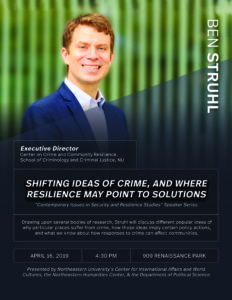“Shifting Ideas of Crime, and Where Resilience May Point to Solutions”
On April 16, Ben Struhl, executive director of Northeastern University’s Center on Crime and Community Resilience, gave a talk titled “Shifting Ideas of Crime, and Where Resilience May Point to Solutions”. This was the fourth and final lecture of Northeastern’s Spring 2019 “Contemporary Issues in Security and Resilience Studies” Speaker Series.
Struhl’s talk focused on three ideas about crime and how they have influenced policy over time. The first idea is that deterrence and incentives are key in reducing crime. This concept was originally theorized by Jeremy Bentham in the late eighteenth century. Bentham, better known for his ideas that gave birth to modern utilitarianism, believed that simply increasing police presence in an area would reduce crime. The theory has since been supported by the success of “hot spot” policing, in which crime is reduced by concentrating police surveillance in specific high-crime areas.

The second idea is that some people have a biological tendency toward criminal behavior, which has largely been disproven since Italian criminologist Cesare Lombroso first proposed it in the mid-nineteenth century. One example of the faulty thinking behind this theory is the success of cognitive behavioral therapy (CBT) in programs like “Becoming a Man”, which reduced criminal activity among young men in Chicago by promoting slower processes of thinking and decision making.
The third idea, made popular by French sociologist Émile Durkheim, is that crime is situational. It has been supported by many experiments, including the Milgram experiment and the “Moving to Opportunity” experiment, which found that when very low income families were moved from poverty-stricken urban areas to more affluent neighborhoods, they were less likely to be involved with crime. Harvard professor Robert Sampson’s work on collective efficacy also suggests that crime is situational. His research demonstrates that crime is high in impoverished neighborhoods because poverty lowers collective efficacy – the ability of community members to deter crime. This ability is closely linked to a community’s social cohesion and resilience.
For Struhl, community resilience is a community’s ability to deal with threats and disruptions. In communities with high poverty and low collective efficacy, there is often a lack of strategies and resources to deal with threats, so crime rates tend to be higher. That is why, Struhl says, his team at the Center on Crime and Community Resilience exists. Their mission is to help people in disadvantaged communities that suffer from high rates of crime by gathering data on crime and the policies designed to address it so that new policies can more effectively deal with the core issues that these communities face.
Struhl believes that the existing resources being spent on crime prevention can and should be used more effectively – the focus ought to be on building community resilience. Most recently, Struhl has concentrated his efforts on the Caribbean. He has worked with community members engaged in all forms of crime-related resilience building, from the Nature Fun Ranch in Barbados, which aims to educate youth and reduce rates of crime through summer work-training programs, to a cognitive behavioral therapy program for police officers in Guyana. He has also identified the lack of domestic violence shelters in St. Kitts as a significant community resilience challenge, and is working to bring one to the island. Another program on the same island – which has the ninth highest homicide rate in the world – aims to strengthen social cohesion by bringing historically divided communities and police officers together in safe settings.
Struhl’s upcoming work for the United States Agency for International Development (USAID) will include gathering data on crime related to the influx of Venezuelan immigrants in Trinidad. His work will continue to look at how communities respond to high rates of crime, and what can be done from a policy standpoint to help them.
For more information on the work being done by Northeastern’s Center on Crime and Community Resilience, visit their website.
